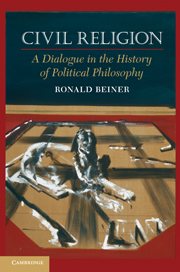Book contents
Introduction
Published online by Cambridge University Press: 05 June 2012
Summary
[P]olitics…issues commands about everything in the state.
– AristotleCivil religion: the appropriation of religion by politics for its own purposes. Why is this an important theme in the history of political philosophy? When religion asserts its own purposes, which are not those of politics, it poses an absolutely fundamental challenge to political authority, and politics cannot take lightly such a radical challenge to its authority. However, civil religion is itself quite a radical response to this predicament. This is why thinkers within the liberal tradition shy away from civil religion or try to come up with a less radical way of resolving the same predicament. This is the source of the profound three-way dialogue within the tradition of political philosophy – between religion, civil religion, and liberalism, which together offer a whole spectrum of possibilities of politicizing or depoliticizing religion.
Leszek Kolakowski offers his own succinct encapsulation of the idea of civil religion. He writes that “a kind of perverse theocracy…seemed to be encouraged even by the implacable Church-haters” – citing Marsilius of Padua, Machiavelli, Hobbes, Spinoza, and Montesquieu as exemplars of this intellectual tradition. (In fact, Kolakowski could even have included Nietzsche in this, in his view dubious, tradition.) Why would “church-haters” wish to embrace civil religion? If these thinkers perceive religion as politically subversive, or as posing a potential threat to political authority, then one evident theoretical strategy would be “to beat the religionists at their own game” – that is to say, to make politics itself the assertor of claims to authority that reach beyond politics or that transcend “merely” political authority.
- Type
- Chapter
- Information
- Civil ReligionA Dialogue in the History of Political Philosophy, pp. 1 - 8Publisher: Cambridge University PressPrint publication year: 2010

